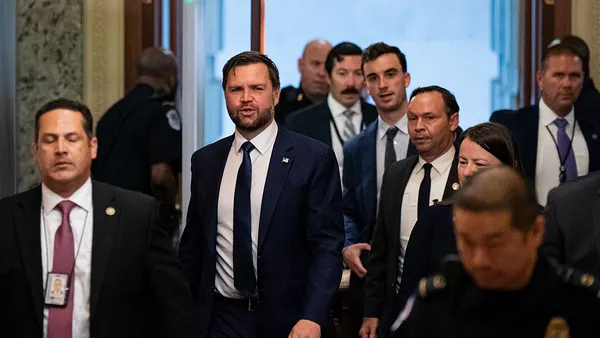Editor's note: This story has been updated with additional information and comment since it was first posted as a breaking news story.
Colleges would no longer need to hold live hearings to evaluate claims of sexual violence and would be responsible for investigating a wide scope of such incidents — even many that occur off campus — under a sweeping new regulatory plan U.S. Secretary of Education Miguel Cardona unveiled Thursday.
Cardona’s draft regulation on Title IX — the federal law banning sex-based discrimination in educational settings — also cements protections for LGBTQ students, making plain that prejudice against a student’s gender identity or sexual orientation could violate the landmark statute. It would compel institutions to potentially punish bullying against transgender students, for instance.
These and other provisions would largely unravel the current regulation set by former Education Secretary Betsy DeVos, considered one of her defining achievements and a milestone in a decade-plus political battle over Title IX.
In constructing the regulation, DeVos was responding to longtime criticism from due process activists, who argued policies the Obama administration instituted coerced colleges to find accused students responsible for sexual violence by threatening to yank their federal funding.
The Biden administration’s proposal — introduced on the 50th anniversary of former President Richard Nixon signing Title IX into law — has a long way to go before the Education Department finalizes it.
Thursday’s release kicks off a process for putting a new rule into force, starting with a 60-day public comment period. The Education Department must review feedback it receives and respond to it in the rule’s final iteration.
This likely will extend the timeline for the rule to take effect, as the current Trump-era draft regulation received more than 120,000 comments. Nearly two years passed between DeVos publishing the draft rule and a final regulation coming into effect.
And the proposed regulation will likely reignite civil liberties activists’ complaints, spurring more political fights and legal challenges from conservatives who say Title IX should not wade into protections for transgender and gay students.
“I firmly reject efforts to politicize these protections and sow division in our schools,” Cardona said during a call with reporters Thursday.
What’s in the new rule vs. the current one?
DeVos’ regulation mandates that colleges hold a judiciary-style hearing to adjudicate sexual misconduct allegations, during which accused students and accusers can cross-examine each other through advisers of their choosing. This is a particular point of contention for advocates for sexual assault survivors, who said the arduous process discourages reporting.
Under Cardona’s draft rule, institutions could decide whether to host such hearings, but they would no longer be required. Colleges could also choose whether they want a decision-maker in a Title IX case to question the parties, or the parties’ advisers.
Colleges will take varying approaches to adjudicating sexual misconduct claims, said Brett Sokolow, president of the Association of Title IX Administrators. Some institutions will certainly scrap live hearings, but those in certain states will still need to adhere to the hearings because of court rulings and state law.
A 2020 decision in the 3rd U.S. Circuit Court of Appeals upheld, for example, that colleges must host the hearings to maintain fairness in sexual misconduct proceedings. The appeals court covers Pennsylvania, New Jersey, Delaware and the Virgin Islands.
And Kentucky passed a law this year enshrining cross-examination and other due process protections at public colleges.
Cardona’s proposal also permits a single college official to both investigate and make a decision on a case. This model, known as a single-investigator system, has frequently come under attack by civil liberties advocates, who argue it does not offer due process.
Joe Cohn is legislative and policy director for the Foundation for Individual Rights and Expression, a civil liberties watchdog. He derided the single-investigator model as allowing one individual to serve as “prosecutor, judge and jury.”
He said the official could have bias, which would taint the Title IX process. And if that investigator missed a key detail, it could affect a case’s outcome.
Hearings have the benefit of allowing those adjudicating a case to witness in real time individuals’ reactions to questions, Cohn said.
“All of these things combined, it’s a total farce when it comes to providing any semblance of fairness,” he said of Cardona’s proposal.
Sokolow said the inclusion allowing a single-investigator model may be a nod to K-12 schools, which are often not as well-resourced in evaluating sexual misconduct and may need to rely on an individual as a fact-finder and decision-maker.
“It would be very difficult for them to provide something more sophisticated than that,” Sokolow said.
Cardona’s plan would also broaden the definition of sexual harassment and expand the range of sexual abuse cases colleges would need to investigate, including those that occurred off campus or on study abroad trips. This is a departure from the DeVos rule, which allowed institutions to choose whether to ignore such episodes.
Further, under the new rule, institutions would largely need to rely on the “preponderance of the evidence” standard when deciding a case. This means a ruling could be made against a student if there is a greater than 50% chance that a claim is true, the same benchmark used in most civil lawsuits.
However, colleges could choose a higher bar, the “clear and convincing” standard, if they use that threshold in similar disciplinary proceedings, such as those involving other forms of harassment.
And the draft rule would strengthen safeguards for pregnant students and employees, including that colleges would need to make reasonable accommodations for them, such as break times and designated spaces for lactation.
Sokolow said the Biden administration has struck an appropriate balance between rights of accused and accusers. Many in the Title IX field considered the Trump administration’s rule too tilted in favor of the former, Sokolow said.
He noted the plan preserves a few elements of the Trump administration’s rule. Accused students must be presumed innocent at the outset of an investigation. Colleges could also pursue informal resolutions, such as mediation, between parties if both sides agreed to it.
“There are some fairly significant due process protections that are still in place,” Sokolow said.
The plan also earned praise from congressional Democrats like Rep. Bobby Scott of Virginia and Sen. Patty Murray of Washington, who chair the House Committee on Education and Labor, and Senate Committee on Health, Education, Labor and Pensions, respectively.
Murray said the proposal represents “a world of change from the backwards DeVos rule, which made it easier for schools to sweep harassment and assault under the rug, and harder for survivors to come forward, seek justice, and feel safe on campus.”
What’s next?
Cardona’s rule dodges one hot-button issue: transgender students in athletics. The Biden administration will engage in a separate rulemaking process to determine criteria for permitting transgender students to participate in sports that align with their gender identity.
A senior Education Department official said Thursday the administration does not have a timeline for pursuing a regulation in this area.
The Biden administration likely separated out protections for transgender athletes to avoid the entire rule being struck down in court, said Jake Sapp, Austin College’s deputy Title IX coordinator and compliance officer, who follows legal matters concerning the law.
Republican policymakers have already made legal threats against any federal policy that safeguards transgender students in athletics.
Fifteen GOP attorneys general in April wrote to the Education Department, demanding it halt the Title IX rulemaking process. They wrote they were “prepared to take legal action to uphold Title IX’s plain meaning and safeguard the integrity of women’s sports.”
Sapp also noted that the department knows it’s not the only entity that has authority on these types of issues. Others include the NCAA.
If Republicans take control of Congress in the midterm elections, they could overturn the rule with the Congressional Review Act. That act gives lawmakers power to reject major executive actions within 60 days of final rules being submitted.
However, many Title IX practitioners and campus officials want the regulatory landscape to settle. They have grown weary of the 11-year regulatory transformation in Title IX, Sokolow said.
A long history of political football
The law was historically best known for trying to ensure equity in athletics, but this shifted in 2011, when the Obama administration issued its guidance directing how colleges should investigate and adjudicate sexual assault claims.
The Obama-era policies are credited with bringing new light to campus sexual violence, which continues to plague colleges nationwide. An Association of American Universities survey released in 2020 found 13% of students had experienced nonconsensual sexual contact.
Yet the guidance also was denounced as the root cause of colleges allegedly trampling due process rights. Title IX litigation exploded, with hundreds of students taking to the courts to allege their institutions botched their sexual violence cases.
This turbulence was partially why observers were uneasy with President Joe Biden’s pick of Catherine Lhamon to helm the Education Department’s Office for Civil Rights, which is charged with resolving student complaints that colleges bungled their Title IX obligations. She barely survived her Senate confirmation last year, with Vice President Kamala Harris casting the tiebreaking vote.
Lhamon also led the Office for Civil Rights during part of the Obama administration and earned conservatives’ ire. They argued her tenure was marred by sexual violence rules slanted against accused students and by policymaking through channels outside the traditional regulatory process.
Sapp said he thinks Lhamon and the department will try to make enforcement of the new regulation more frequent and visible than in past years.
Title IX permits the federal government to rescind colleges’ federal funding if they violate the law, though this has never done this before. Colleges typically resolve Title IX complaints by making agreements with the Education Department in which they pledge to change their policies. Governing boards likely wouldn’t fight the department, Sapp said.
He also said the department will probably go after more “peripheral issues” in Title IX, like discrimination against pregnant students. This month, the Education Department determined the Utah-based Salt Lake Community College violated Title IX by encouraging a pregnant student to drop a course and not providing her with accommodations.
“We’ll see very publicized voluntary agreements,” Sapp said.




















